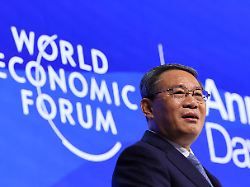Xi Jinping unsettles investors
Foreign companies are investing less in China
January 19, 2024, 10:33 p.m
Listen to article
This audio version was artificially generated. More info | Send feedback
For the first time since 2012, significantly fewer companies are investing in China. Experts also assume that investments will fall in 2024. In Davos, China’s prime minister is trying to promote business. However, President Xi’s policies continue to unsettle.
De-risking, weak economy, high credit costs: Foreign companies invested less in China in 2023 for the first time in more than a decade. Their direct investments totaled just 1.13 trillion yuan (146 billion euros), as the Ministry of Commerce in Beijing announced. This corresponds to a decrease of 8.0 percent compared to the previous year. It is the first minus since 2012.
This development does not come as a complete surprise. Many Western governments are encouraging companies not to put everything on China’s cards, but rather to diversify investments more widely. Instead, investments are increasingly being made in emerging countries that are more friendly towards the West – such as India. This strategy is also called de-risking. The federal government presented such a strategy for dealing with China in July 2023. It strives for greater economic independence.
“2024 will be even worse”
In addition, China’s economy is no longer running smoothly. The real estate crisis in particular is putting a strain on growth, which has recently been significantly lower than before the corona pandemic. Analysts at major bank UBS expect gross domestic product to grow by just 4.6 percent this year, after 5.3 percent in 2023. Experts expect that the decline in investments will not remain a flash in the pan. “Things will get worse in 2024,” said Alicia Garcia Herrero, chief Asia-Pacific economist at financial firm Natixis. “I think foreign direct investment will continue to decline.”
Premier Li Qiang stressed at the World Economic Forum this week that the Chinese economy is open for business. He highlighted the potential for foreign investment. It is important to break down barriers to cooperation. China remains determined to open its economy. The decision to invest in the Chinese market is not a risk, but an opportunity.
But President Xi Jinping’s increasing focus on national security – particularly the recent crackdown on consulting firms – has unsettled many foreign companies. They also fear that the Taiwan conflict could escalate and result in Western sanctions – similar to those against Russia after the attack on Ukraine. Borrowing costs for multinational companies also rose last year as a result of interest rate increases by the US Federal Reserve, for example. As a result, parents of Chinese subsidiaries have been reluctant to increase investments, analysts said.
